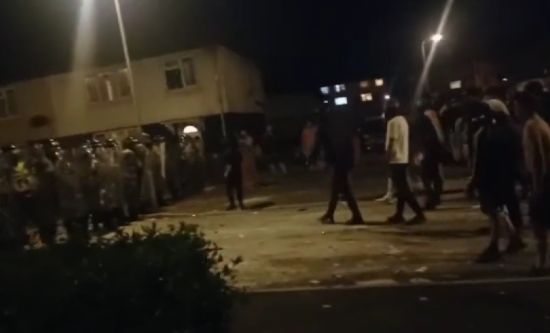
On the night of Monday 22 May South Wales Police faced the fiery wrath of the youth of Ely, one of Cardiff’s most deprived areas. Hours before two young members of their community, Harvey Evans and Kyrees Sullivan, aged 15 and 16, died when the electric bike they were riding crashed with a vehicle, after being chased by a police van. The police systematically lied, denying being anywhere near the boys until CCTV footage revealed a police vehicle following the bike just three minutes before the crash. Eyewitnesses told the media the police van had been travelling towards the boys ‘at speed’, and local people said police seemed to have a particular grudge against young people using e-bikes in the area.
Anger at the deaths, along with the disrespectful way locals and family members were treated by police in the aftermath of the crash, enraged the community, particularly young people who laid responsibility squarely at the feet of the police and began to gather in large numbers. Police arrived in large numbers in riot gear. The confrontation lasted into the night with over 100 predominantly young people unleashing volleys of bricks, slabs, and a round of fireworks into the fully-armoured police lines. Nine young people were arrested; police say 15 of their number were injured.
Those involved in this show of resistance in Ely are being painted as mindless thugs and vandals yet the willingness of the youth there to fight back against the police is not just a reflection of the anger in the moment, but also of pent-up anger and a conscious understanding of who their enemy is from their own daily experiences. Anyone from areas such as Ely knows the attitudes and tactics used by the police when it comes to predominantly working-class areas. Older people will remember the brutal repression of the 1991 ‘bread riots’ in Ely that came in response to rising poverty and unemployment and earlier battles in South Wales as police attacked striking miners. No one in Ely has any illusions in the police or whose interests and property they protect. Young people in particular are aware of the contempt in which the police hold working class youth.
Today Ely is still among the most deprived areas in Wales. Nearly 60% of children are eligible for free school meals – a key indicator of poverty – more than any other community in Wales. Unemployment is around 10%, with about 39% of those having never worked and more than half not in the past 12 months. A third of young people leave school with no qualifications.
While the media continues to demonise the youth of Ely and attempt to dig up dirt on the local community, nowhere have they done the same level of dirt digging on South Wales Police. This is despite it being listed in a recent report by the National Police Chiefs Council as having the highest number of officers involved in allegations of sexual and physical violence against women in Wales, accounting for 63% of all complaints against Welsh police forces along with a history of racism and sexism.
So far nine people, aged between 15 and 29, have been arrested on suspicion of rioting with the authorities promising more to come. It’s obvious that if found guilty those arrested are likely to face harsh punishment in the name of ‘deterrence’; with worsening living standards and no end to the racism, sexism, corruption and hatred for the working class that permeates the British police, similar events will occur in other areas. Meanwhile the names of Harvey Evans and Kyrees Sullivan join a long list of those who have died after contact with the police. A list that will inevitably continue to grow unless the very institution of the British police along with the bourgeois state it serves to protect are abolished.
Aaron Caldwell




